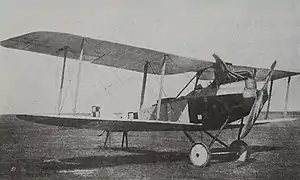| C.I | |
|---|---|
 | |
| Role | Reconnaissance aircraft |
| Manufacturer | Rumpler Flugzeugwerke |
| Introduction | 1915 |
| Primary users | Luftstreitkräfte Poland |
| Produced | 1915 - 1917 |
| Variants | Rumpler 6B-1 |
Entering service in 1915, the Rumpler C.I, (company designation 5A 2),[1] two-seater single-engine reconnaissance biplane, was one of the first German C-type aircraft, and also one of the longest serving in its class during World War I, being retired from the last front line units only in early 1918.
Design and development
The C.I was a successful design, and it was used on Western and Eastern Fronts, Macedonia, Salonika and Palestine. Early production examples were armed only with a single Parabellum machine gun on a Schneider ring mounting, but later aircraft had additionally a synchronised Spandau gun on the port side of fuselage. When used as a light bomber the C.I could also carry 100 kg of bombs.
In addition to the parent company, the Bayerische Rumpler-Werke, the Rumpler C.I was also produced by the Germania Flugzeug-Werke, the Märkische Flugzeug-Werke, the Hannoversche Waggonfabrik and the Albert Rinne Flugzeug-Werke. Variants included the C.Ia, which used a 180 hp Argus As.III engine instead of Mercedes D.III, the C.II, of which there's no evidence that any were actually built, 6B 1 single-seat floatplane fighter, and a Rumpler-built batch of C.Is intended for training which omitted the gun ring in the rear cockpit and was powered by a 150 hp Benz Bz.III.
It was this training role in which the C.I was latterly used, its friendly handling qualities making it suitable to be flown even by inexperienced pilots.
Operators
- Latvian Air Force - Postwar.
- Lithuanian Air Force - Postwar. 3 aircraft (No. 2699, 4936, 8144) purchased in 1919.[2]
- Polish Air Force - Postwar.
- Royal Yugoslav Air Force - Postwar.
Specifications (C.I)
Data from German Aircraft of the First World War[1]
General characteristics
- Crew: 2
- Length: 7.85 m (25 ft 9 in)
- Wingspan: 12.15 m (39 ft 10 in)
- Height: 3.06 m (10 ft 0 in)
- Wing area: 35.7 m2 (384 sq ft)
- Empty weight: 793 kg (1,748 lb)
- Gross weight: 1,333 kg (2,939 lb)
- Fuel capacity: 240 L (63 US gal; 53 imp gal) in 200 L (53 US gal; 44 imp gal)main fuselage tank and 40 L (11 US gal; 8.8 imp gal) centre-section gravity tank
- Powerplant: 1 × Mercedes D.III 6-cylinder water-cooled in-line piston engine, 120 kW (160 hp)
Alternative engines:
- 134 kW (180 hp) Argus As.III in C.Ia aircraft from Hannoversche Waggonfabrik
- 112 kW (150 hp) Benz Bz.III in Bayru-built C.Is, modified as trainers with dual control. (Bayru. - Bayerische Rumpler Werke)
- Propellers: 2-bladed fixed-pitch propeller
Performance
- Maximum speed: 152 km/h (94 mph, 82 kn) at sea level
- Endurance: 4 hours
- Service ceiling: 5,050 m (16,570 ft)
- Wing loading: 36 kg/m2 (7.4 lb/sq ft)
Armament
See also
Aircraft of comparable role, configuration, and era
References
- 1 2 Gray, Peter; Thetford, Owen (1970). German Aircraft of the First World War (2nd ed.). London: Putnam. pp. 195–198. ISBN 0-370-00103-6.
- ↑ Ramoška, G. "Lietuvos Aviacijos Istorija 1919 - 1940 m. : Pirmieji karo aviacijos lėktuvai 1919-23 m." plienosparnai.lt (in Lithuanian). Retrieved 12 December 2019.
Further reading
- Herris, Jack (2014). Rumpler Aircraft of WWI: A Centennial Perspective on Great War Airplanes. Great War Aviation Centennial Series. Vol. 11. n.p.: Aeronaut Books. ISBN 978-1-935881-21-6.
- Klaauw, Bart van der (March–April 1999). "Unexpected Windfalls: Accidentally or Deliberately, More than 100 Aircraft 'arrived' in Dutch Territory During the Great War". Air Enthusiast (80): 54–59. ISSN 0143-5450.
- Neulen, Hans-Werner & Cony, Christophe (August 2000). "Les aigles du Kaiser en Terre Sainte" [The Kaiser's Eagles in the Holy Land]. Avions: Toute l'Aéronautique et son histoire (in French) (89): 34–43. ISSN 1243-8650.